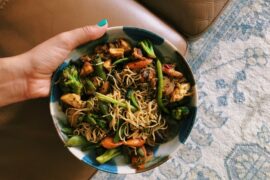Many of the foods you eat — even the organic brands — aren’t created sustainably. You do your best to be conscious of your food intake and how it affects the planet, by choosing foods that are sustainably sourced, but sometimes companies label their foods inaccurately. This practice is frustrating as a consumer because you want to receive what you pay for. Fortunately, you have some solutions, such as reducing your consumption of industrial foods and buying from trusted sources.
You may be wondering how you can do this. After all, it’s easy to obtain commercial goods, making you more likely to choose these unsustainable products when cravings hit. But if you’re dedicated to the cause, making the switch from industrial to homegrown isn’t a chore, and it pays off in the long run. Purchasing products that benefit your local community and the world at large are worth the effort.
What Is Sustainable Sourcing?
Many only consider food quality when discussing sustainability, but distribution and labour practices are also crucial. When you source your food, you purchase animal and plant products cultivated in ways friendly to the environment, labourers and livestock. Sustainability ensures conservation-based farming methods and proper treatment of agriculturists. It proves little harm to the environment and produces food with no hidden chemicals or diseases.
Sourcing your ingredients from known locations allows you to control what you put into your body. You don’t have to stress over consuming products associated with cruelty to livestock and inhumane labour practices. When your food is closer to home, fewer fossil fuels and processing treatments are involved. Local agriculturists implement strategies like crop rotation and natural pest removal to promote biodiversity and soil health.
Why Is It Important?
Most people have relatives who’ll inherit the Earth after they’re gone. This knowledge encourages people to take steps toward moulding a world suitable for their loved ones to thrive in. This task becomes difficult with multiplying environmental challenges, which is why sustainability has shown itself as a valuable contender.
Eco-friendly foods offer a myriad of health benefits because farmers grow them without pesticides, herbicides or poor soil conditions. Whole foods are rich in nutrients and contain disease-fighting antioxidants. Antioxidants exist in many foods, such as berries, whole grains and avocados, and they can prevent ailments like Alzheimer’s and Parkinson’s. Leafy greens have links to dental health, and nuts contain fats essential for cardiovascular wellness.
You may believe that society leans toward cheap convenience, but this isn’t entirely true. Globally, 66% of people showed an interest in paying more for green products. Sustainability is no passing trend — people increase their efforts wherever they can. By eating consciously, you preserve your health as well as the planet’s wellbeing.
Ways To Implement It
Various working parts are responsible for making food green, and you are one of them. Businesses create supply where there’s demand, and by supporting local initiatives and agriculturists, you contribute to the rise of eco-friendly food practices. Read on for a few easy ways to make your diet and buying practices sustainable:
Shop locally: Visit your local farmer’s market and check out their goods. They offer an abundance of foods that you can eat alone or combine to create healthy, flavourful recipes. Eating homegrown food means you avoid contributing to the production of more fossil fuels. Plus, fresh food is the best in terms of flavour and nutrition.
Grow your own food: Start with simple plants that don’t require much maintenance. You may need some practice if gardening is new to you, but it comes naturally with time. Don’t have enough space for a garden or live in a rental? No worries — get creative and create small gardens out of mason jars and other household containers.
Preserve your food: Make your food last longer and reduce the amount of waste that goes to landfills. Save leftovers and use them to make new meals. Buy sustainable frozen vegetables and fruits. If you’re ambitious, you can try dehydrating, freezing and other preservation methods.
Make recipes to substitute store-bought goods: You may have some foods you don’t think you can live without, like a favourite yogurt or oatmeal. Going green doesn’t mean forsaking your goodies — look up recipes online and make your own with eco-friendly ingredients.
Buy seasonally: If you buy a fruit or veggie that’s out of season in your area, it was grown someplace distant — which spells more fuel output. Buy goods when they’re in season, and use your preservation techniques to make them last longer.
Eat Better, Live Better
You’ll have peace of mind knowing your food buying habits supplement your environmentalist lifestyle. You don’t have to choose one or the other — straightforward and enjoyable alternatives exist. Now all you have to do is start using them.
Author Bio
Emily is a freelance writer, covering conservation and sustainability. You can read her blog, Conservation Folks, for more of her work.


































